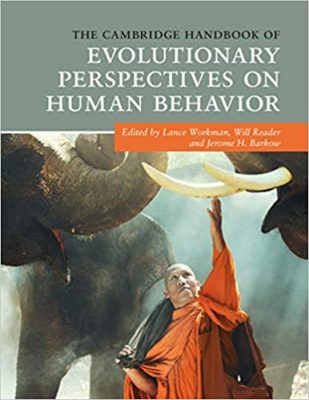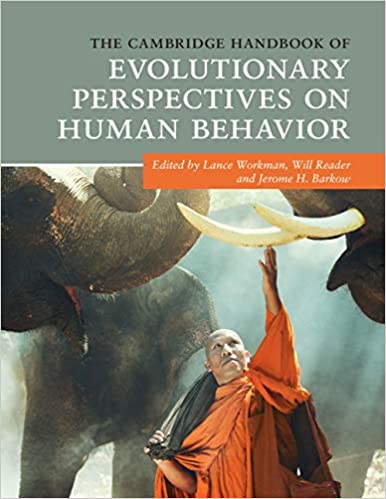 Editors: Lance Workman, Will Reader, and Jerome H. Barkow
Editors: Lance Workman, Will Reader, and Jerome H. Barkow
Publisher: Cambridge University Press – 561 pages
Book Review by: Nano Khilnani
This is a wide-ranging book on the evolution of many types of human behavior, something that the evolutionist Charles Darwin predicted. The editors – Lance Workman, Will Reader, and Jerome H. Barkow – quote him as writing:
“In the distant future I see open fields for more important researches. Psychology will be based on a new foundation, that of the necessary acquirement of each mental power and capacity by gradation.”
Eighty people, mainly in universities, from 10 countries – Canada, Denmark, Germany, Hungary, Italy, Malaysia, the Netherlands, New Zealand, the United Kingdom, and the United States – contributed content to this large book with 45 chapters, listed below:
- Part I – The Comparative Approach
- Human-Grey Parrot Comparisons in Cognitive Performance
- Cognitive Abilities in Elephants
- Culture and Communication Among Cetacians
- Part II – Sociocultural Anthropology and Evolution
- Eusociality in Humans
- The Nature of Psychological Foundation of Social Universals
- The Study of Culture and Evolution Across Disciplines
- Part III – Evolution and Neuroscience
- Are Evolutionary Psychology and the Neuroscience of Motivation Compatible?
- Are We Destined to be Happy? The Neuroscience of Making Sense of Pleasure
- Environmental Pressures on Trans-generational Epigenetic Inheritance: An Evolutionary Development Mechanism Influencing Atypical Neurodevelopment in Autism?
- Part IV – Group Living: The Evolution of Social and Moral Behavior
- The Problem of Altruism and Future Directions
- Can Evolutionary Processes Explain the Origins of Morality?
- The Evolution and Function of Third-Party Moral Judgment
- Evolution of the Human Family
- The Parasite-Stress Theory of Cultural values and Sociality
- The Evolution of Pride and Shame
- Thinking Outside the Head: Cognitive Ecologies and Evolutionary Psychology
- Part V – Evolution and Cognition
- Runaway Processes in Modern Human Culture: An Evolutionary Approach to Exaggerated Communication in Present Human Societies
- Ontogeny of Tactical Deception
- The Evolution of Language: A Darwinian Approach
- The Adaptive Problem of Exploiting Resources: Human Foraging Behavior in Patchy Environments
- Part VI – Evolution and Development
- Evolutionary Developmental Psychology: Developing Adaptations in Infancy ad Childhood
- The Ontogeny and Evolution of Cooperation
- Genomic Imprinting Is Critical for Understanding the Development and Adaptive Design of Psychological Mechanisms in Humans and Animals
- Evolutionary Explanations for Bullying Behavior
- Birth Order and Evolutionary Psychology
- Part VII – Sexual Selection and Human Sex Differences
- Survival, Selection, and Sex Differences in Fear
- The Enigmatic Urge: How Sexual Desire Works
- Are Humans Peacocks or Robins?
- Human Mate Selection: A Multidimensional Approach
- Kin Selection and the Evolution of Male Androphilia
- Evolutionary Psychology: Thoughts on Integrating Feminist Perspectives
- Part VIII – Abnormal Behavior and Evolutionary Psychopathology
- Psychopathology from an Evolutionary Perspective
- Are We on the Verge of Darwinian Psychiatry?
- The Evolution of Pro-social Behavior: From Caring to Compassion
- Disordered Social Cognition: Alexithymia and Interoception
- Part IX – Applying Evolutionary Principles
- A Bridge Too Far? Evolutionary Psychology and the Solution of Social Problems
- The Evolution of Personality
- Applying Evolutionary Principles to Criminality
- Substitute Parenting
- Historians and the Evolutionary Approach to Human Behavior
- The Psychology of Extraterrestrials: The Next Frontier?
- Part X – Evolution and the Media
- Daily Talk Shows as Virtual Gossip Communities
- Supernormal Stimuli in the Media
- An Evolutionary Approach to Horror Media
- The Internet Is for Porn: Evolutionary Perspectives on Online Pornography
In sum, this book is a sort of long and highly detailed discourse on evolutionary psychology, the study of human behaviors acquired, developed, and refined to enhance survival and propagation of the human species.
These adaptive behaviors are now part of many branches of psychology, such as cognitive, developmental, and social psychology, as well as parts of a large variety of other fields, such as for example, socio-cultural anthropology, feminist theory, media studies, psychiatry, and other disciplines as well. .
It’s a good book that makes us think about where we came from, are in, and headed to.
Editors:
Lance Workman is a visiting Professor in Psychology at the University of South Wales in the United Kingdom.
Will Reader is a Senior Lecturer in Psychology at Sheffield Hallam Wales in the United Kingdom.
Jerome H. Barkow is a multidisciplinary researcher. He is Professor Emeritus of Social Anthropology at Dalhousie University in Halifax, Canada where he has spent most of his career.





